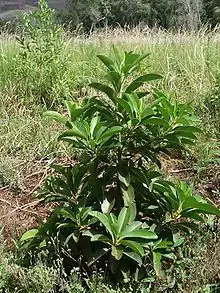Arillastrum
Arillastrum is a monotypic genus of trees in the myrtle family, Myrtaceae, containing the single species Arillastrum gummiferum. It is endemic to southern New Caledonia.[3][4] It is related to Eucalyptus, but more closely to Angophora and Corymbia.[5]
| Arillastrum | |
|---|---|
 | |
| Scientific classification | |
| Kingdom: | Plantae |
| Clade: | Tracheophytes |
| Clade: | Angiosperms |
| Clade: | Eudicots |
| Clade: | Rosids |
| Order: | Myrtales |
| Family: | Myrtaceae |
| Subfamily: | Myrtoideae |
| Tribe: | Eucalypteae |
| Genus: | Arillastrum Pancher ex Baill.[2] |
| Species: | A. gummiferum |
| Binomial name | |
| Arillastrum gummiferum | |
It is a tree up to 35 meters tall with a trunk over a meter wide. It might flower only every seven years. The flowers each have four clusters of stamens and staminodes.[4]
This species grows on ultramafic rock substrates. It grows in stands with other individuals of its species.[4]
The species has been called "one of New Caledonia's most economically and ecologically significant trees".[4] It has been heavily exploited for its strong, dark red, resinous wood, which is useful for the construction of buildings, bridges, boats, and telephone poles. Its populations have been significantly reduced by logging.[4]
References
- Amice, R., Butin, J.-P., Fleurot, D., Garnier, D., Goxe, J., Hequet, V., Lannuzel, G., Suprin, B. & Veillon, J.-M. (2020). "Hintonia latiflora". IUCN Red List of Threatened Species. 2020: e.T171131037A171161289. Retrieved July 12, 2020.CS1 maint: multiple names: authors list (link)
- "Arillastrum Pancher ex Baill". Plants of the World Online. The Trustees of the Royal Botanic Gardens, Kew. n.d. Retrieved July 12, 2020.
- Dawson, J.W. (1992) Myrtaceae - Leptospermoideae. In Flore de La Nouvelle-Calédonie et Dépendances, edited by P. Morat and H. S. MacKee, 18: 1–251. Paris: Muséum National d’Histoire Naturelle, 1992.
- Wilcox, M. (2004). Le chêne gomme (Arillastrum gummiferum) – New Caledonia's eucalypt. Auckland Bot. Soc. J 59(1), 43-44.
- Thornhill, Andrew H., Simon Y.W. Ho, Carsten Külheim, and Michael D. Crisp. (2015) "Interpreting the Modern Distribution of Myrtaceae Using a Dated Molecular Phylogeny." Molecular Phylogenetics and Evolution 93: 29–43. doi:10.1016/j.ympev.2015.07.007.

